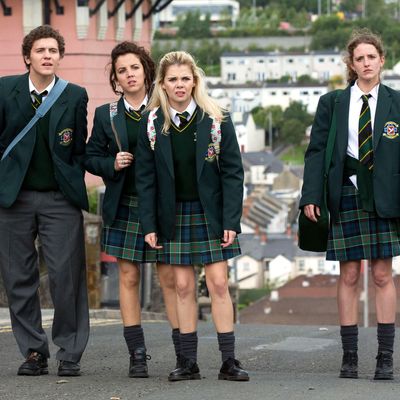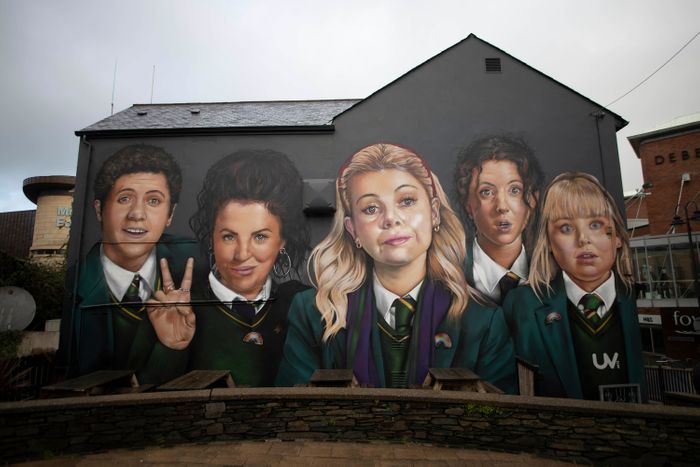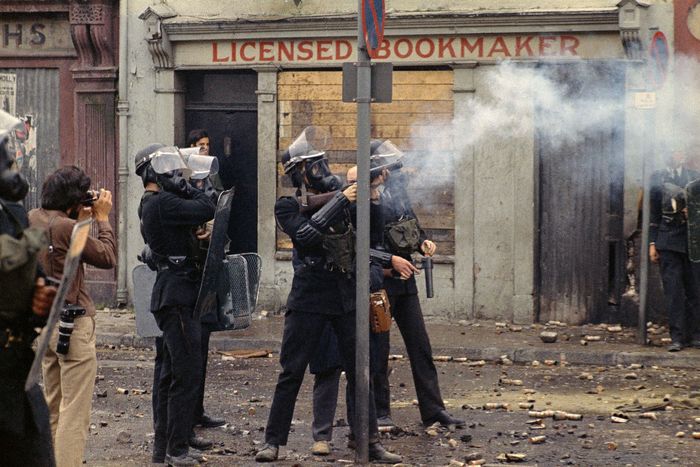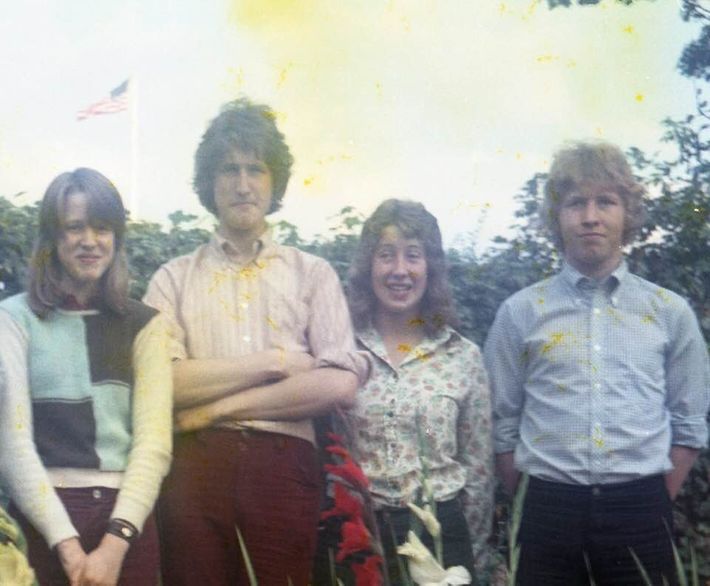
Many Americans of Irish extraction turn their lineage into romantic tales of deep roots, bygone suffering, and picturesque desperation. Unfortunately for me, the story of the Joneses in Northern Ireland is awkward, unglamorous, and short. The family moved there from England in the mid-1950s, when my grandfather started working at a British naval base in Derry, a mid-sized city near the border with the Republic of Ireland. He died when my dad was a teenager, around the same time a Catholic civil-rights campaign against gerrymandering, housing discrimination, and undemocratic elections sparked a 30-year period of sectarian violence known as The Troubles. My grandmother eventually packed up and moved, as did most of her children. (An Undertone supposedly lives in the family’s old house.) My dad went to England for university; on break he met an American girl who was in art school in Wales. When she got into visa trouble, they moved to the U.S. and got married, which is where I showed up.
In sum, the Joneses were in the old country a little while, had a mostly bad time, then left. It’s hardly “Wild Mountain Thyme,” is it?
Still, Derry remains the closest thing my father has to a hometown. As a child, I was terrified and entranced by his stories about the place, most of which involved masked men knocking on your door in the middle of the night and shooting you in front of your family, and all of which could not have seemed further away from my own sunny, Clinton-era youth. Now, the rest of the world seems to have caught my fascination. Somehow, someway, Northern Ireland is in the Zeitgeist again. Game of Thrones helped put the country back on the map, and so, paradoxically, did Brexit: The Leave campaign devoted so little attention to what the referendum would mean for the North that, in the three years since, the belated debate about the Irish border has become one of the paramount issues in British politics. The culture industry, too, has turned its eyes toward Ulster. Jez Buttersworth’s The Ferryman, a sprawling family epic set among the disappearances of the early ’80s, earned raves both in the West End and on Broadway, while Anna Burns’s Milkman, a blank evocation of growing up in a city rife with paramilitary reprisals, took home last year’s Man Booker Prize. As Clinton/Blair liberalism recedes into history, the bad old days of the Troubles seem to be back on people’s minds.
And then there’s Derry Girls, the critically acclaimed Channel 4 comedy whose second season is currently streaming on Netflix in the U.S. A coming-of-age sitcom following four Catholic teens and their English buddy in 1990s Derry, the series is a fizzy antidote to the grimness that pervades most Northern Irish stories. Yes, there are bomb scares, Orange Order marches, and an IRA man trying to hitch a ride over the border, but all that takes a sometimes literal backseat to more typical teen concerns like popularity, romance, and step aerobics. It admittedly took me a while to adjust to the show’s broad comedy — the grimness of Troubles added a bit of unearned grit to my self-image, and I was loath to give it up — but it’s a genuine phenomenon in the North: When the first season aired, over half the TV sets in Northern Ireland were tuned into Derry Girls.
It’s also huge on Facebook, at least the parts of Facebook where the Joneses, very few of whom live in the same country, congregate. Besides Brexit, Trump, and Game of Thrones, nothing gets the newsfeed popping like Derry Girls. So, in the interests of learning more about the show’s depictions of life in Northern Ireland, I called up two members of my extended family with strong ties to the country — partially to get a sense of what Derry Girls was like from their perspective, and partially because I wanted an excuse to talk to them.
I first spoke to Mary, a Derry girl through and through. She was married to my uncle for much of my childhood, but before that her father owned a pharmacy that became a local landmark, and as a girl she attended Thornhill College, the all-female Catholic school that inspired the series.
The Troubles began when Mary was in her early teens. “If you grow up somewhere war-torn, it’s quite different from what you would imagine, especially for young people,” she told me. When the riots started, she and her friends would go downtown to watch them instead of going to dances. “We didn’t really think it was anything dangerous, it was just a stupid thing teenagers were doing. Things got very out of hand. You would get sprayed with tear gas.” Mary came from a strict Catholic family, so hanging out with those of the other persuasion was definitely against the rules, but at the riots she would meet Protestant kids who wanted to see what all the fuss was about, too. Eventually, they became friends. “We were running with Protestant people all the time,” she said. “It was nothing to us.”
Many reviews of Derry Girls spotlight the skillful way it depicts life amid the bombs and barricades. That’s Mary’s favorite part of the show, too. Her father’s shop was on the main road into town, and the British army eventually put up a checkpoint right outside. Every time the IRA blew up the checkpoint, they blew up the store as well. (The joke in Derry was, “Buy now while shops last.”) “Things like that happened all the time,” Mary said. “You just kind of rolled with it. There was nothing else you could do. It made people maybe a wee bit reckless. They were in a hurry to have their life right now — don’t wait. You would expect that everything would be suspended and people would do nothing. But it was the opposite. People got into life, really took it by the throat.” On rare occasions, Mary said, you could make the Troubles work for you: “People used to use bomb scares as an excuse to get out of school.” If you were really bold, or just hadn’t done your homework, you might even risk calling one in yourself.
Since Derry Girls premiered, my dad has claimed a kinship with James, “the wee English fella,” a British soft boy whose fish-out-of-water status makes him an audience surrogate for viewers outside Northern Ireland. My dad and his siblings maintain that, as kids from England, they were stuck in the middle of both tribes: They couldn’t hang with the Catholics, of course, but the local Protestants didn’t have much use for them, either. I had been slightly skeptical of this narrative, wondering if this was perhaps a case of the Joneses demonstrating our usual extreme self-consciousness. But nope. “They were like from another planet entirely,” Mary said. “Derry Prods, you knew what you were dealing with, but an English Prod, you had no idea.” However, this difference held a little bit of allure, too. Many viewers have noted that, in real life, the girls at school would probably be all over James, and that was true for Mary, who got together with my uncle as a teenager. “[They] were a bit different, sort of funny accents,” she said of my dad and his siblings. “That was so glamorous to me when I was 17.”
Of the seven kids in my dad’s family, six of them left Northern Ireland, scattering around the English-speaking parts of the globe. My cousin Rose is the daughter of the aunt who stayed, and in the ’90s she too was a teenage girl listening to “The Key, the Secret” and wondering why so many animals kept escaping from Northern Irish zoos. It wouldn’t be right to say the Troubles had died down by then, but they’d gained a different tenor. People had gotten slightly more used to certain things; checking your bag before you went into Boots was more an inconvenience than an affront. The big events still affected your life, of course, but being young made it slightly easier to stay in your bubble. The first season of Derry Girls ends with a montage contrasting the girls’ lively step-aerobics routine with their parents huddling around a TV, watching the latest explosion. To Rose, that rings absolutely true. She was on holiday in the Republic when the Omagh bomb went off, and remembers the mood that came over the adults as the news played on the radio. “As a teenager, you don’t really get what it means,” she said. “It’s not a hundred percent real for you.”
Rose lives in London now, and after Derry Girls premiered, she was struck by the different ways it was perceived on either side of the Irish Sea. “Everyone from Northern Ireland liked the first series, but people in England thought it was weird,” she said. “But the things they thought were surreal in England were not surreal in Northern Ireland.” Like the way a daffy aunt is bummed that a bomb means she won’t be able to go tanning, or a blackboard where high-schoolers have to write down the differences between Catholics and Protestants. “People in England thought those things were totally silly and exaggerated for effect,” she said. “But they weren’t. Those things were true.”
I should also mention that, unlike the girls in Derry Girls, Rose is Protestant and grew up in Belfast. Still, certain aspects of teen life transcended those boundaries — especially the efforts to transcend those boundaries. “Literally everybody my age in Northern Ireland had to go on one of those stupid ‘education for mutual understanding’ things,” Rose said. In Derry Girls, they go rappelling with Protestants; Rose went to a water-sports center, her brother Mark went to a farm, and one of her friends raised a symbolic standing stone in honor of the new millennium. “They thought that was going to solve everything. Like, Let’s make teenagers meet other teenagers from the other side and realize that they’re normal. But nobody thought that people weren’t normal.” As in Derry Girls, kids spent basically the whole time talking to the people they already knew.
Neither Rose nor Mary considers Derry Girls a perfect show. Mary thinks there’s too much profanity, while Rose gets annoyed that the show fiddles with the timeline when it includes real historical events. (Bill Clinton’s visit to Derry didn’t take place in the summer, like the show implies, but around Christmastime.) But in my conversations with them, both told stories that highlighted one of the key takeaways from the series: the multitude of things that people in Northern Ireland could get used to, but also, the things that never did feel normal.
Like my dad, Rose left to go to school in England, which was its own kind of adjustment. She remembers stopping in every store to open her purse, just like she did back home in the North, before realizing “nobody gives a shit about my bag here.” Later, she was riding her bike down what turned out to be the wrong way on a one-way street, when she was stopped by a guy dressed in a Bobby uniform, hat and all. In a scene that could be taken from a future episode of Derry Girls, she refused to stop, since she thought it was a joke. “I didn’t know anyone would actually wear that,” she said. “To me, that was not a policeman. All police guys wore flak jackets and carried machine guns.” (She eventually let the guy do his job.)
Mary’s story is darker. After the bombings and riots of the late ‘60s, the British army had come to Northern Ireland to keep the peace. “All of Derry was thrilled. They were welcomed and brought into houses for a cup of tea and all that,” she said. “But after a couple of months, the blush went off that rose.” Rather than neutral overseers, the troops were soon considered another symbol of Protestant domination. But they were still young men in uniform, and considering Derry was full of eligible young women, romance often bloomed. “One time, I was in the hairdresser’s having my hair cut and a girl came in with a scarf in her head. She took off the scarf — oh my God, what happened to you? She was a Catholic girl who was dating a British soldier. She had been tarred and feathered. How does a young person grow up in the middle of that craziness?” She paused. “Make a TV show, that’s one way to deal with it.”





